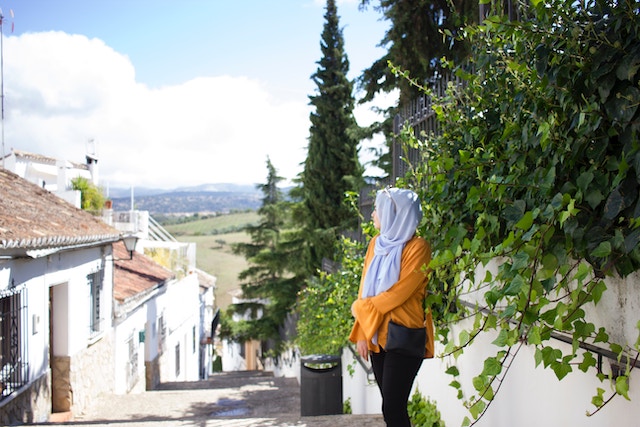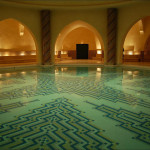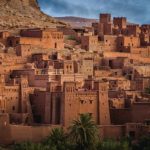What I Learned from Muslim Women in Morocco

I have never particularly enjoyed living with other people; I am rather introverted, using my room as my space to recharge for the next social situation. When arriving to Morocco, I was told that I would be placed with a Moroccan roommate. Internally, I sighed and resigned myself to accepting the inevitable self-conscious conversations, cultural confusions, and conflicting bedtimes.
I was so very wrong.
From the moment I met Sara, a petite woman with a huge smile, she defied every preconception I had about having a random roommate—Moroccan or otherwise. Not only that, but along with so many other women I have met, Sara has reinvented my perceptions of Muslim women.
To clarify, I have liberal and open ideas about the power of women, no matter the culture they are from. However, American media propagates certain stereotypes and misconceptions about Muslim women that are hard to ignore. Thus, just two weeks into my time in Morocco, my preconceived perceptions about Muslim women have been obliterated and reconstructed.
Western culture has the misconception that if a woman is a Muslim, then she is required to cover herself.
Within Islam, women have choices about how they dress or present themselves to the outside world. Western culture has the misconception that if a woman is a Muslim, then she is required to cover herself. I was actually afraid that I would have to wear a headscarf everywhere that I went in Morocco. Sara does not wear a headscarf. Walking down the streets of Imouzzer, where my internship is based, I see women of many ages wearing a variety of head coverings: headscarves (hijabs), face coverings (niqabs), full body and face coverings (burkas), and other styles.
There is no requirement for the women to wear a headdress; instead, what she wears is determined by how she feels most comfortable. In general, women dress modestly. The occasional unassuming Western tourist stands out with her booty shorts and tank top in a sea of linen pants, scarves and long-sleeved shirts.
I have learned that Muslim women are just the same as American women: they sing in the shower, they adopt babies, they flirt with cute men, they wear whatever they want, they bicker, they pray.
Another misconception that I held that Sara and others have debunked is that Muslim women are married off as teenagers. While it is common in rural areas to be married by the age of eighteen or twenty, many women also choose to wait. Wandering the al-Akhawayn campus, I see cutesy college couples dotted under the trees and in the cafes. But there are also single ladies working and walking with their girlfriends, each striving for her future.
I have met many women, had conversations about the availability of contraception in Morocco— which is available— about the rates of maturity between men and women, about their futures as parents, or their disinterest of ever being a parent or a wife. They have an independent personal choice.
What I Learned from Muslim Women in Morocco
American media presents Muslim women as dependent, voiceless housewives. The women I work with daily at the Women’s Center are not dependent on anyone for validation. I teach English five days a week to a class of older women who are finessing their trade skills so that they can become more financially independent.
The organization that I am interning with, Greenside Development Foundation, works to end women and youth unemployment through entrepreneurship. Over the past year, 1200 women and youth have been trained in six different cities in the culinary arts, rug-weaving, sewing, and hairdressing; they each have the end goal of starting up their own business. They are a picture of empowerment.
The occasional unassuming Western tourist stands out with her booty shorts and tank top in a sea of linen pants, scarves and long-sleeved shirts.
Every day in class I see improvements in communication, and women who are gaining independence through learning a new language. As we work through the three language barrier—Darija, French, and Tamazight—I learn so much about the determination of these women, and the similarities between our cultures and our thoughts and our opinions.
Sara is an example of middle class achievement. She graduated this semester with a Bachelor’s in Computer Science, and will be pursuing her Master’s in Sweden this coming fall.
Fatima approached me after her first day in class, and showed me videos and pictures of her two daughters on her Samsung Galaxy 1. She explained how she pushes her girls to learn English at a local center so that they may have more opportunities in the world.
I have heard the words “global language” from so many of my students, it makes my head ring. They understand the importance of English, and these women willfully put themselves through the arduous struggle of learning such a muddled and inconsistently patterned language.
Ultimately, I have learned that Muslim women are just the same as American women: they sing in the shower, they adopt babies, they flirt with cute men, they wear whatever they want, they bicker, they pray.
At night, when I return to my room, exhausted and covered in dust and marker stains, I do not have an awkward conversation with my roommate.
Instead, I share my new experiences, tell her what I learned today, asking about cultural cues I missed while eating dates at exactly 7:33 PM. We bond over the uncertainty of our futures as college graduates, groan about adult acne, before mumbling “sweet dreams” into the pillow as we both give ourselves to sleep.
Ultimately, I have learned that Muslim women are just the same as American women: they sing in the shower, they adopt babies, they flirt with cute men, they wear whatever they want, they bicker, they pray.
What I Learned from Muslim Women in Morocco Related Reading
Celebrating the End of Ramadan: Feasts, Family, and a Moroccan Wedding
Have you traveled to Morocco? How was your trip? Email us at [email protected] for information about sharing your experience and advice with the Pink Pangea community. We can’t wait to hear from you.
Photo credits for What I Learned from Muslim Women in Morocco by Jessica Shen.









So enjoyed this Sanantha! Very proud of u!